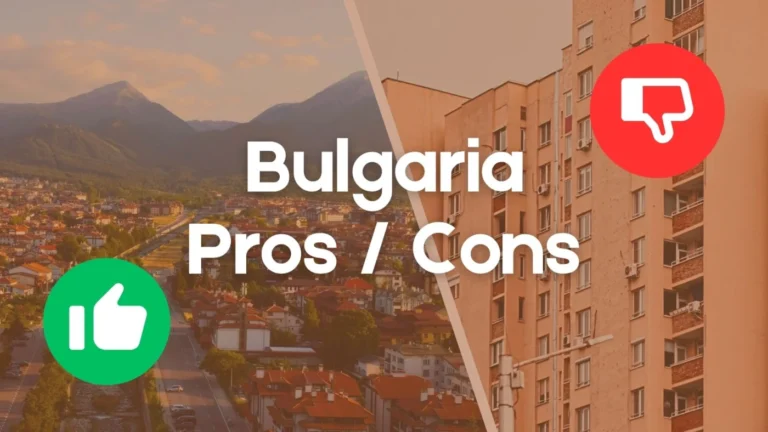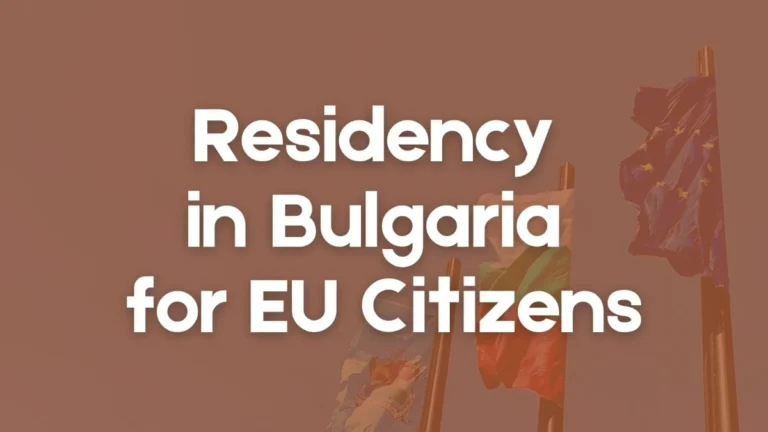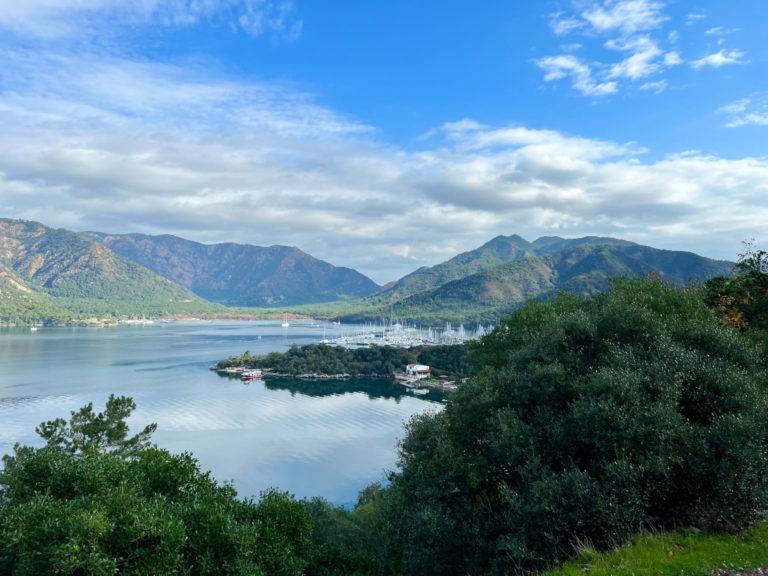After spending about 1,5 years in Southeast Asia, and then relocating to Sofia, Bulgaria, we’ve had a lot of time to compare the two. This article is about sharing when and why one destination might suit you better than the other.
As I’m writing this, I’m in Bangkok, Thailand. It’s Saturday, and I sent my husband René out to meet with his friend so I could finally record a video without hearing him talk on Zoom all day. That’s what inspired the topic: remote work in Asia versus Eastern Europe.
Looking for how to relocate to Bulgaria? I’ve helped other expats through this process.
→ Download my FREE Bulgarian Residency Checklist (includes documents needed for EU and non-EU citizens)
→ Book a 1-1 intro call to ask your questions directly
→ Or let me help you with getting a residence permit in Bulgaria in person (only 3 slots every month available)
Cost of Living — Southeast Asia vs. Eastern Europe
If you’re here, you’re probably also doing lots of research on cost of living. Prices are going up all over the world, and a lot of us are trying to find a better setup that fits our budget and lifestyle.
My YouTube Subscribers range from digital nomads in their 20s to retirees in their 60s. And while everyone’s situation is different, I want to focus this comparison on people like me and René (my husband) — those who are:
- Working remotely
- Looking to build a future
- Wanting a stable home base
- Interested in tax optimization
- Needing a home office and reliable internet
If that sounds like you, this article will be especially relevant.
Read More:
Getting Residency in Bulgaria as an EU Citizen: Requirements, Process & Benefits
How to Retire in Bulgaria as a Non-EU Citizen (2025 Guide)
When Southeast Asia Still Makes Sense
If you’re just starting out as a digital nomad or you’re already retired with no work obligations, Southeast Asia might still be perfect. I’ve made videos about living in Da Nang, Vietnam, and I think it’s a great destination right now. We spent over a year there and had a wonderful experience.
You can enjoy the weather, culture, affordable prices, and maybe even take care of your health by staying active and eating fresh food. But if you’re working online, you might start noticing the downsides that pile up over time: humidity, mold, power cuts, and the kind of air pollution that forces you to stay indoors for days, and a lifestyle that doesn’t always support productivity.
Why We Left Southeast Asia for Bulgaria
We both work full-time remotely. We wanted:
- A stable, legal home base
- A place where we can set up a real home office of a reasonable price
- Clear tax residency
- Less transient energy than typical nomad hubs
In Bulgaria, we could do all that. We also didn’t want to constantly look for new rentals or bounce between short-term visas. At some point, the novelty of constant travel wears off, and you start looking for long-term stability.
We also realized that our needs had changed. While Southeast Asia is great for a more flexible or short-term lifestyle, it started to feel less aligned with our long-term goals. Our friends were in different time zones, we worked evenings instead of days, and felt a bit disconnected from the rhythm of our lives back in Europe.
The Real Cost of Living — and Why Portugal Didn’t Work
Yes, Asia is often cheaper — but not always. When you live in places like Thailand or Vietnam long-term, you might be surprised at how quickly the small expenses add up. Eating out daily, Western groceries, frequent Grab rides—all of it adds up fast. And unless you’re living exactly like a local, the cost gap with Eastern Europe isn’t as big as you think.
In Bulgaria, we found the balance we were missing: affordable rent, stable internet, functional heating and cooling, and the ability to build a life that feels professional and peaceful. For the same price or less than we paid in Bangkok, we got a bright apartment with proper heating, space for a home office, fast internet, and peace and quiet. No humidity, no mold, no fear of power cuts, no crossing your fingers when turning on the hot water.
We actually tried Portugal before Bulgaria—and while it looked great on paper, we ended up overpaying for a noisy apartment in Lisbon that didn’t feel safe or comfortable. That experience made us realize how important local knowledge is, and how tricky the rental market can be in Western Europe. Bulgaria gave us much more value for money and peace of mind.
Apartments — What You Actually Get in Bangkok and Sofia
In Bangkok, you can find a tiny condo on the outskirts for €300–400. There will be just enough space for a bed, a tiny table and couch, and a small kitchenette. The same setup in the city center will cost around €800–1000.
In Bulgaria, you can rent a larger, modern one-bedroom apartment with a full kitchen near the city center for €400–500, or a two-bedroom for €700–900. If you’re flexible with location or furnishings, the price can drop by 50%. In Bangkok, I would budget €2000 for a similar setup.
So, living in Bulgaria on the budget of a central studio in Bangkok, we get a spacious two-bedroom with a full kitchen—and finally have a proper home office that isn’t squeezed into our living room or bedroom.
In Sofia, for the same price or less, we got a bright apartment with proper heating, space for a home office, and peace and quiet. It felt like we could finally breathe again—and focus.
Residency — Legal Status and Long-Term Stability
Then there’s residency and taxes. In Thailand, there is a digital nomad visa option now (DTV), but it’s still relatively new and not available to everyone. In Vietnam, you’re still on a 3-month visa and need to leave the country to renew. In Bulgaria, for EU citizens and their partners, there is an option to register for legal 5-year residency in just a few steps—and that comes with clear tax status, EU protections, and a sense of belonging you can’t get in Asia.
For non-EU citizens and retirees there are option to get 1-year residency that you can extend every year.
FREE: Bulgaria Residence Checklist
Residency Application in Sofia, Bulgaria (EU Passport Holders & Non-EU Retirees)
I offer personal assistance to help you with documents and a visit to the immigration office in Sofia, Bulgaria.
Money back guarantee! If you change your mind before I start working on your case, you’ll get a full refund — no risk involved. Limited to 3 private clients each month, so book now to secure yours before they’re gone.
What’s Included:
- 1-on-1 Consultation (1 hour) : step by step guidance
- Ongoing Email Support – I will prepare the documents and make sure you have everything ready for your application in Sofia.
- In-Person Assistance – we’ll go together to the immigration office in Sofia and, if needed, visit a notary or translator. We will have my assistant present to help with translation from Bulgarian.
- Housing Guidance – Instructions on finding long-term rentals and the best neighborhoods to live in.
- BONUS: Includes access to an exclusive Bulgaria Q&A chat managed by me and invitations to future expat meetups + Bulgaria Relocation Guide
Only 3 slots available each month. Join the waiting list
Safety — Feeling at Home and Protected
What about personal safety?
Both in Thailand/Vietnam and in Sofia, Bulgaria, I felt safe. I wouldn’t wander alone at night in an unfamiliar area, but I’m also not afraid of violent crime or someone chasing me down the street.
What about natural disasters? Southeast Asia is a region where typhoons and flooding happen, as well as earthquakes—like the recent one in Myanmar that was felt in Bangkok. And although these events don’t happen often, it’s still something to consider if you’re planning to stay long-term.
Looking for how to relocate to Bulgaria? I’ve helped other expats through this process.
→ Download my FREE Bulgarian Residency Checklist (includes documents needed for EU and non-EU citizens)
→ Book a 1-1 intro call to ask your questions directly
→ Or let me help you with getting a residence permit in Bulgaria in person (only 3 slots every month available)
Final Thoughts — So, Asia or Bulgaria?
If you’re young, just starting out, or want to test the waters for a few months—Southeast Asia can be amazing.
But if you’re ready for more stability, want to optimize your taxes legally, need a reliable setup for remote work, and still want to live affordably in Europe—Bulgaria makes a lot of sense.
If you’re coming from the digital nomad world, it might take a mindset shift. Eastern Europe (and Bulgaria in particular) gives you:
- Legal residency (especially easy for EU citizens)
- Low flat taxes (10% income tax)
- Reliable infrastructure
- A growing remote work community
- Seasons, fresh air, and nature (not just constant heat or humidity)
It’s not as trendy or hyped, but that’s kind of the point. We’re not here to chase the next hotspot—we’re here to build something real and sustainable.
If you’re thinking of making a base in Europe, and want something outside of the typical options like Portugal or Spain, I highly recommend giving Bulgaria a closer look.That’s why we’re here.
Thinking of Moving to Sofia, Bulgaria?
I’ve put together a relocation guide and private chat access to help people like you avoid rookie mistakes. Whether you’re figuring out where to live, how to rent without overpaying, or how to apply for long-term residency—it’s all in one place.

Where to live?
Which documents do you need?
Do you register as a freelancer or as a company?
How to pay taxes?
Is Bulgaria even the right choice for you?
I’ve been there.
That’s why I created this Chat & Guide — so you don’t have to spend weeks in research mode, guessing your way through bureaucracy, or worrying about mistakes that could cost you time and money.










